


xxxxxThe Dreyfus
Affair, a bitter controversy that deeply divided French society,
began in 1894
with the conviction of a young Jewish army officer, Albert Dreyfus
(1859-1935), on a charge of treason. He was deported to the
French colony of Guiana, and his arrest unleashed a wave of anti-Jewish
propaganda, fanned by powerful anti-Semitic feeling within
the army and the Catholic Church. Two years later, however, fresh
evidence suggested that he was innocent, and that a fellow
officer, Major Marie Charles Esterhazy, had been the German spy.
The French high command, however, was not prepared to reopen the
case, and this caused a wave of protest from liberal, republican
elements, plunging the country into the worst political and social
flare-up in the history of the Third Republic. Eventually
Esterhazy was brought to trial, but when he was acquitted in
January 1898 further demonstrations broke out. It was then that
the French novelist Émil Zola wrote his open letter (J’accuse)
to the French President. Published in L’Aurore,
it accused the army leaders and the War Office of anti-Semitism,
and of covering-up a clear case of injustice. He was charged
with libel and was forced to take refuge in England, but his
letter proved the turning point. Dreyfus was given a retrial and
when, despite everything, he was still found guilty, the
government intervened, quashed the verdict and pardoned him in
1899. He was fully reinstated in 1906. The Dreyfus Affair had
serious consequences. Both the army and the Catholic Church were
discredited and lost much of their political influence, and
republicanism triumphed over monarchism. And the controversy left
deep scars on French political, social and intellectual life, and
the anti-Semitism it displayed took long to live down in a
nation dedicated to liberty, equality and fraternity.
THE DREYFUS AFFAIR 1894 -
1906 (Vc, E7)
Acknowledgements
Dreyfus: c1890,
photographer unknown – The Museum of the Art and History of
Judaism, Paris. Degradation: detail of
engraving by the French artist Henri Meyer (1844-1899), front
cover of a supplement to the daily Parisian newspaper Le
Petit Journal, January 1895 – Lorraine Beitler Collection
of the Dreyfus Affair, Rare Book and Manuscript Library,
University of Pennsylvania, USA. Esterhazy:
detail of a caricature by the French illustrator Jean Baptiste
Guth (active 1883-1921), published in the British weekly
magazine Vanity Fair (1868-1914) in
May 1898. France: by the French portrait
photographer Wilhelm Benque (1843-1903) – Tucker Collection,
Archives, New York Public Library.
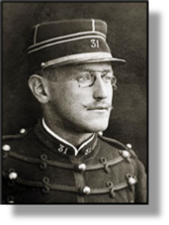
xxxxxThe Dreyfus Affair, a bitter controversy centred
around the conviction of a Jewish French army officer on a charge
of treason, deeply divided French society, and plunged the country
into the worst political and social flare-up in the history
of the Third Republic. Its consequences were significant and long
lasting. It thrust the republican wing of political life into a
dominant position, undermined the standing of the army, and
eventually led to the separation of Church and State.
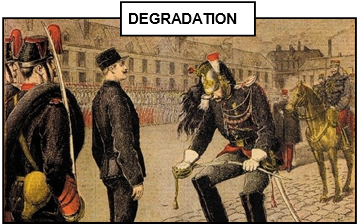 xxxxxItxwas in 1893 that a young
artillery captain of Jewish faith named Alfred
Dreyfus (1859-1935), on the staff
at the War Ministry, was accused of having written a document
betraying secret information to the German military attaché in
Paris. In November 1894,
despite the lack of conclusive evidence
and his strong denial of the charge, he was found guilty by a
court martial, ceremoniously reduced in rank (illustrated), and sentenced to
life imprisonment on Devil’s Island, a penal settlement off the
coast of French Guiana. The matter might well have ended there, but
two years later the new chief of military intelligence, a Lieutenant
Colonel George Picquart, uncovered evidence to suggest that, in
fact, the document had not been written by Dreyfus, but by a French
infantry officer named Major Marie Charles Esterhazy. The French
high command, however, not wishing to reopen the matter and have
questions raised as to their competence and racial
bias, ignored Picquart’s suggestion, posted him to Tunisia,
and had forged documents made to strengthen the original verdict.
xxxxxItxwas in 1893 that a young
artillery captain of Jewish faith named Alfred
Dreyfus (1859-1935), on the staff
at the War Ministry, was accused of having written a document
betraying secret information to the German military attaché in
Paris. In November 1894,
despite the lack of conclusive evidence
and his strong denial of the charge, he was found guilty by a
court martial, ceremoniously reduced in rank (illustrated), and sentenced to
life imprisonment on Devil’s Island, a penal settlement off the
coast of French Guiana. The matter might well have ended there, but
two years later the new chief of military intelligence, a Lieutenant
Colonel George Picquart, uncovered evidence to suggest that, in
fact, the document had not been written by Dreyfus, but by a French
infantry officer named Major Marie Charles Esterhazy. The French
high command, however, not wishing to reopen the matter and have
questions raised as to their competence and racial
bias, ignored Picquart’s suggestion, posted him to Tunisia,
and had forged documents made to strengthen the original verdict.
xxxxxAt the same
time, however, evidence implicating Esterhazy had come to the
knowledge of the Dreyfus family and a number of his friends. As a
result, Dreyfus' brother Mathieu succeeded in having Esterhazy
brought to trial in 1897. But Despite the new evidence available,
the court martial acquitted Esterhazy of alleged forgery early in
1898. By that time, through rumour and evidence passed to the
Press, much of the detail surrounding the case had leaked out, and
the Dreyfus Affair, as it came to be known, had become a highly
divisive issue in French society.
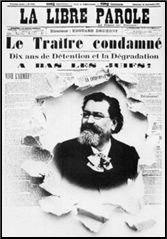 xxxxxWhen Dreyfus was originally found guilty the news
unleashed a wave of anti-Jewish propaganda. Fanned by
powerful anti-Semitic feeling - ever present in both the
French army and the Catholic Church - it surprised many by
its strength and its extent. There were rallies decrying the Jews
in Paris and throughout the provinces, and many, like Édouard
Drumont, the editor of the newspaper La Libre
Parole, saw Dreyfus as typifying the disloyalty of French
Jews as a whole. At first, given Dreyfus’ apparent guilt -
decided in camera, be it noted - liberal factions were
obliged to remain silent, but with the discovery of the evidence
against Esterhazy,
followed by the summary dismissal of his accuser and the acquittal
of Esterhazy, the mood changed rapidly. There now came a volume of
protest across the country against what was seen as a clear case
of injustice, accompanied by a vociferous demand for a retrial of
Dreyfus to right the wrong. Very soon France was bitterly divided
between those who upheld the sentence imposed on the young Jewish
officer - the right-wing conservative elements, the army
and the Roman Catholic Church - and those who were convinced
that he was innocent, a victim of racial prejudice - the
liberal politicians, the radical republicans and the intellectual
élite.
xxxxxWhen Dreyfus was originally found guilty the news
unleashed a wave of anti-Jewish propaganda. Fanned by
powerful anti-Semitic feeling - ever present in both the
French army and the Catholic Church - it surprised many by
its strength and its extent. There were rallies decrying the Jews
in Paris and throughout the provinces, and many, like Édouard
Drumont, the editor of the newspaper La Libre
Parole, saw Dreyfus as typifying the disloyalty of French
Jews as a whole. At first, given Dreyfus’ apparent guilt -
decided in camera, be it noted - liberal factions were
obliged to remain silent, but with the discovery of the evidence
against Esterhazy,
followed by the summary dismissal of his accuser and the acquittal
of Esterhazy, the mood changed rapidly. There now came a volume of
protest across the country against what was seen as a clear case
of injustice, accompanied by a vociferous demand for a retrial of
Dreyfus to right the wrong. Very soon France was bitterly divided
between those who upheld the sentence imposed on the young Jewish
officer - the right-wing conservative elements, the army
and the Roman Catholic Church - and those who were convinced
that he was innocent, a victim of racial prejudice - the
liberal politicians, the radical republicans and the intellectual
élite.
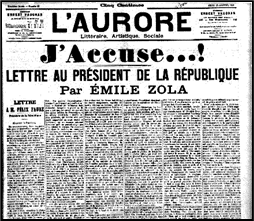 xxxxxThexjournalist and left-wing
politician George Clemenceau (1841-1929) was one of the first to come to the
support of Dreyfus. He began an eight-year campaign to see
justice done, waged via the columns of his two newspapers La
Justice and L’Aurore. His
political connections and his close friendship with the best-known
writers and artists of the day gained him widespread backing for
the cause. But it was one of his literary friends, the novelist Émil Zola, who more than any
other person galvanised support. On the 13th January 1898, just a
few days after Esterhazy had been acquitted, he published an open
letter to the French president (Félix Faure) on the front page of
the daily L’Aurore. Now known the world
over as “J’accuse” (the opening words)
it was a fierce denunciation of the French general staff. In it,
he charged a number of high-ranking officers and the War
Office itself of anti-Semitism, and of deliberately
attempting to cover up a miscarriage of justice. It was a
courageous, impassioned attack and, by evening, 200,000 copies of
the newspaper had been sold. The letter proved a turning point in
the affair, made the more so by the punishment metered out to Zola
as a consequence. He was found guilty of libel, fined 3,000
francs, and sentenced to a year in prison. However, when his
appeal against the verdict looked likely to fail, he fled to
England, and only returned to France in June 1899 after receiving
the promise of an amnesty. Whilst in London his account of the
Dreyfus affair ensured that the matter received even greater
worldwide coverage.
xxxxxThexjournalist and left-wing
politician George Clemenceau (1841-1929) was one of the first to come to the
support of Dreyfus. He began an eight-year campaign to see
justice done, waged via the columns of his two newspapers La
Justice and L’Aurore. His
political connections and his close friendship with the best-known
writers and artists of the day gained him widespread backing for
the cause. But it was one of his literary friends, the novelist Émil Zola, who more than any
other person galvanised support. On the 13th January 1898, just a
few days after Esterhazy had been acquitted, he published an open
letter to the French president (Félix Faure) on the front page of
the daily L’Aurore. Now known the world
over as “J’accuse” (the opening words)
it was a fierce denunciation of the French general staff. In it,
he charged a number of high-ranking officers and the War
Office itself of anti-Semitism, and of deliberately
attempting to cover up a miscarriage of justice. It was a
courageous, impassioned attack and, by evening, 200,000 copies of
the newspaper had been sold. The letter proved a turning point in
the affair, made the more so by the punishment metered out to Zola
as a consequence. He was found guilty of libel, fined 3,000
francs, and sentenced to a year in prison. However, when his
appeal against the verdict looked likely to fail, he fled to
England, and only returned to France in June 1899 after receiving
the promise of an amnesty. Whilst in London his account of the
Dreyfus affair ensured that the matter received even greater
worldwide coverage.
xxxxxMeanwhile,
in August 1898 a new revelation added fuel to the burning issue.
Picquart’s successor as head of intelligence, a Lieutenant Colonel
Hubert-Joseph Henry, admitted that he had forged documents in
order to implicate Dreyfus. He was arrested, but committed suicide
whilst in custody. On the strength of this confession Esterhazy
was dismissed from the army. He beat a hasty retreat to England,
leaving France in turmoil. Unruly demonstrations and counter-demonstrations
took place across the country, and the funeral of president Faure
in February 1899 - a man who had always opposed a retrial -
was the scene of an ugly disturbance between the pro and anti
Dreyfus groups. Eventually in June the liberal politician René
Waldeck-Rousseau was asked to form a coalition government.
Resolved to bring the affair to an end before a complete breakdown
of law and order, he sanctioned a retrial. A second court martial
was held at Rennes in September 1899, but, despite the new
evidence, Dreyfus was again found guilty of treason, his term of
imprisonment being reduced to ten years because of “extenuating
circumstances”. The verdict caused widespread anger among the pro-Dreyfusards
and threatened further trouble, but ten days later the government
intervened. The verdict of the court was quashed and Dreyfus was
given a presidential pardon.
xxxxxIt was not,
however, until July 1906 that the Court of Appeal exonerated
Dreyfus and reversed all previous convictions against him. He was
readmitted to the army with the rank of major, awarded the Legion
of Honour, and went on to serve in the First World War. He
attained the rank of lieutenant colonel, retired after the war,
and died in 1935. He was buried in Montparnasse cemetery in Paris.
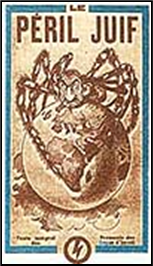 xxxxxThe Dreyfus Affair went far deeper than simply the
matter of the guilt or the innocence of a young army officer of
Jewish descent. First and perhaps foremost, it revealed the
powerful strain of anti-Semitism running throughout French
society - surprisingly strong in a nation dedicated to
liberty, equality and fraternity. Secondly, it polarized the
country’s political make-up in the wake of the humiliation of
the Franco-PrussIan War and the overthrow of the Emperor. For
the pro-Dreyfusards - the republicans and the socialists
- the issue at stake was the freedom of the individual and
the survival of the Republic. For the anti-Dreyfusards -
the conservative, military and Catholic forces (monarchists at
heart) - the need was to defend the authority of the army and
state against socialism and the dangers, as they saw it, posed by
international Jewry.
xxxxxThe Dreyfus Affair went far deeper than simply the
matter of the guilt or the innocence of a young army officer of
Jewish descent. First and perhaps foremost, it revealed the
powerful strain of anti-Semitism running throughout French
society - surprisingly strong in a nation dedicated to
liberty, equality and fraternity. Secondly, it polarized the
country’s political make-up in the wake of the humiliation of
the Franco-PrussIan War and the overthrow of the Emperor. For
the pro-Dreyfusards - the republicans and the socialists
- the issue at stake was the freedom of the individual and
the survival of the Republic. For the anti-Dreyfusards -
the conservative, military and Catholic forces (monarchists at
heart) - the need was to defend the authority of the army and
state against socialism and the dangers, as they saw it, posed by
international Jewry.
xxxxxFollowing
the vindication of Captain Dreyfus - a victory for republican
ideals encapsulated in the rights of man - the power and the
prestige of the military and of the Catholic Church declined in
France. The army - the bastion of monarchism - was
discredited beyond total repair and put under civilian control,
whilst the introduction of anti-clerical legislation
eventually led to the separation of church and state in 1905, and
a consequent reduction in the role of religion in political
affairs. A political format was eventually reached, but the bitter
controversy aroused by the Dreyfus Affair, rumbling on over twelve
years, left deep scars on French political, social and
intellectual life, and these took more than a generation to heal.
xxxxxIncidentally, Esterhazy (illustrated) later confessed
to being a German spy and li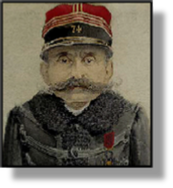 ved
out his life in England, supported by the donations of anti-Semitics.
He worked as a translator, using the name Count Jean de Voilement,
and died in Harpenden, Hertfordshire, in 1923. Colonel Picquart was
reinstated, promoted to general, and served as war minister in the
government of prime-minister Georges Clemenceau from 1906 to 1909. As noted earlier, Zola died in
1902, killed by the fumes from a bedroom fire. It was officially
seen as an accident, but many believed that the chimney had been
blocked up deliberately by anti-Dreyfusards as an act of
revenge for his crucial support of the young Jewish officer. ……
ved
out his life in England, supported by the donations of anti-Semitics.
He worked as a translator, using the name Count Jean de Voilement,
and died in Harpenden, Hertfordshire, in 1923. Colonel Picquart was
reinstated, promoted to general, and served as war minister in the
government of prime-minister Georges Clemenceau from 1906 to 1909. As noted earlier, Zola died in
1902, killed by the fumes from a bedroom fire. It was officially
seen as an accident, but many believed that the chimney had been
blocked up deliberately by anti-Dreyfusards as an act of
revenge for his crucial support of the young Jewish officer. ……
 xxxxx…… Likexxmany
Jews at the time, the Austro-Hungarian journalist Theodor Herzl (1860-1904)
was surprised and alarmed at the amount of anti-Semitism that
the Dreyfus Affair revealed at all levels of French society. He
witnessed mass rallies in Paris where many chanted “Death to the
Jews”. He later explained that it was this aspect of the Dreyfus
Affair (together with the anti-Jewish pogroms in Russia) that
prompted him to found the Zionist Movement in
1897, an organisation in favour of the re-establishment of a
Jewish Homeland in Palestine. Given the extent of anti-Semitism
that existed above and below the surface, he came to realise that
assimilation was impossible, and that the only solution for the
Jews would be the creation of a Jewish state. ……
xxxxx…… Likexxmany
Jews at the time, the Austro-Hungarian journalist Theodor Herzl (1860-1904)
was surprised and alarmed at the amount of anti-Semitism that
the Dreyfus Affair revealed at all levels of French society. He
witnessed mass rallies in Paris where many chanted “Death to the
Jews”. He later explained that it was this aspect of the Dreyfus
Affair (together with the anti-Jewish pogroms in Russia) that
prompted him to found the Zionist Movement in
1897, an organisation in favour of the re-establishment of a
Jewish Homeland in Palestine. Given the extent of anti-Semitism
that existed above and below the surface, he came to realise that
assimilation was impossible, and that the only solution for the
Jews would be the creation of a Jewish state. ……
xxxxx…… The Dreyfus Affair overshadowed and served to
distract public attention from the Fashoda Crisis, a military
confrontation between French and British forces in the Sudan in 1898 which, as we shall
see, could easily have ended in a full-scale war. The fact
that it didn’t may have been influenced to some degree by the
government’s preoccupation with matters nearer to home.
Vc-1881-1901-Vc-1881-1901-Vc-1881-1901-Vc-1881-1901-Vc-1881-1901-Vc-1881-1901-Vc
Including:
Émile Zola and
Anatole France

xxxxxAmong the
many intellectuals who supported Dreyfus was the French novelist,
poet and critic Anatole France (1844-1924). He wrote a vast number of works, but
is mostly remembered today for his novels, including
The Crime of Sylvester Bonnard, My
Friend’s Book, Thaïs, Penguin
Island, The Gods are
Athirst, and his Contemporary History,
a four volume work in which he exposed the social and political
shortcomings highlighted by the Dreyfus Affair. His works were
admired for the clarity of their prose and verse, and for the
satirical attack they launched upon the failings within the Church
and State of his day. In his later years, embittered and more
pessimistic, he turned his attention to social affairs, supporting
civil liberties and the rights of the working man, and attacking
bourgeois values. A well respected man of letters, he was admitted
to the Académie Française in 1896 and awarded the Nobel Prize for
literature in 1921. He worked as a librarian at the French Senate
for fourteen years, and was one time literary critic for the
newspaper Le Temps. He was born Jacques-François-Anatole
Thibault, and took his pen name from the bookshop, the Librairie
de France, that his father owned in Paris.
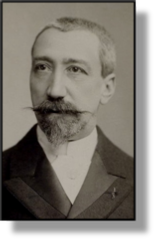 xxxxxAmong the large number of French intellectuals who
came to the defence of Dreyfus - including the poet Charles
Péguy and the writer Marcel Proust - was the French novelist,
poet, and critic Anatole France (1844-1924). He was the first to sign Zola’s manifesto supporting
Dreyfus, and he wrote about the affair in his novel Monsieur
Bergeret in Paris, published in 1901. In this work the
hero, France himself in fact - a hitherto detached observer
of political and social life - throws himself whole heartedly
into the struggle to prove the innocence of this young Jewish
officer.
xxxxxAmong the large number of French intellectuals who
came to the defence of Dreyfus - including the poet Charles
Péguy and the writer Marcel Proust - was the French novelist,
poet, and critic Anatole France (1844-1924). He was the first to sign Zola’s manifesto supporting
Dreyfus, and he wrote about the affair in his novel Monsieur
Bergeret in Paris, published in 1901. In this work the
hero, France himself in fact - a hitherto detached observer
of political and social life - throws himself whole heartedly
into the struggle to prove the innocence of this young Jewish
officer.
xxxxxFrance was
born in Paris, the son of a bookseller, and this accounts for his
love of books and the depth of his reading. After receiving a
fairly good grounding in the classics at the College Stanislas, a
private Catholic school, he decided to devote his life to
literature. At first, however, he was obliged to make a living.
For the next twenty years - save for a brief period of
military service in the Franco-Prussian War - he took on
a variety of jobs. He assisted his father in his shop for a while,
did some teaching, and then worked in journalism as a publisher’s
reader and critic. Then in 1876 he was appointed assistant
librarian at the French Senate, a post he held for fourteen years,
and in 1888 he started writing a regular weekly column as the
literary critic for the prestigious newspaper Le
Temps.
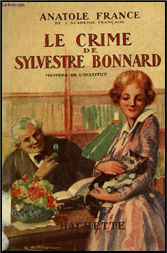 xxxxxBut he never let employment get in the way of his
writing. His output was vast and included novels, short stories,
verse, drama, historical works and critical and philosophical
essays and articles. Today, however, he is chiefly remembered as a
novelist and story teller. His first work of importance was a
critical study of the French poet Alfred de Vigny in 1869, and he
followed this up in the 1870s with a volume of poetry, Golden
Tales, a verse drama entitled The
Bride of Corinth, and his first collection of short
stories, Jocasta and the Thin Cat. But
it was the publication of his first novel in 1881, The
Crime of Sylvester Bonnard, that brought him the
beginning of fame and fortune. A nostalgic look-back at what
he saw as the golden age of the 18th century, it displayed the
graceful, elegant prose, the subtle but sharp irony (reminiscent
of Voltaire),
and the genuine human sympathy that were to become the hallmarks
of his writing. It won him a prize from the Académie
Française, and began a production of novels which made
him one of the leading figures of French literature in the late
19th and early 20th centuries. In nearly all of these works he
took a cynical, pessimistic view of contemporary society, aiming
much of his shrewd criticism at what he saw as the failings within
Church and State.
xxxxxBut he never let employment get in the way of his
writing. His output was vast and included novels, short stories,
verse, drama, historical works and critical and philosophical
essays and articles. Today, however, he is chiefly remembered as a
novelist and story teller. His first work of importance was a
critical study of the French poet Alfred de Vigny in 1869, and he
followed this up in the 1870s with a volume of poetry, Golden
Tales, a verse drama entitled The
Bride of Corinth, and his first collection of short
stories, Jocasta and the Thin Cat. But
it was the publication of his first novel in 1881, The
Crime of Sylvester Bonnard, that brought him the
beginning of fame and fortune. A nostalgic look-back at what
he saw as the golden age of the 18th century, it displayed the
graceful, elegant prose, the subtle but sharp irony (reminiscent
of Voltaire),
and the genuine human sympathy that were to become the hallmarks
of his writing. It won him a prize from the Académie
Française, and began a production of novels which made
him one of the leading figures of French literature in the late
19th and early 20th centuries. In nearly all of these works he
took a cynical, pessimistic view of contemporary society, aiming
much of his shrewd criticism at what he saw as the failings within
Church and State.
xxxxxHis
writings of the late 1880s and early 1990s, included his critical
essays, La vie littéraire in four
volumes, and the novels Balthazar, a
fanciful tale centred around one of the Magi; Thaïs,
a denunciation of asceticism, set in Egypt in the early Christian
era; The Opinions of Mr. Jérôme Coignard,
and At the Sign of the Reine Pédauque -
both exposing human frailty from a detached view point - and
The Red Lily, a tragic love story played
out in Florence. And to this period belongs My
Friend’s Book, the first of his semi-autobiographical
series.

xxxxxBy the mid-1890s,
however, there was a noticeable change in emphasis. Following the
outbreak of the Dreyfus Affair, beginning in earnest in 1896 (the
year France was admitted to the Académie
Française), France became progressively disillusioned,
and his view of life more embittered. He now turned his attention
to social affairs, such as civil liberties and the rights of the
working man, and in so doing, launched a more bitter attack upon
society as a whole and the Church and the political establishment
in particular. And his open hostility towards bourgeois values led
him to embrace socialism and, eventually, communism. His Contemporary
History, for example, four prose works spanning 1897 to
1901, made much of the social and political shortcomings
highlighted by the Dreyfus Affair, as did his three act comedy Crainquebill of 1903, his satirical
allegory Penguin Island of 1908, and his realistic fantasy The
Revolt of the Angels of 1914. And to this period belongs
one of his best known works, Les Dieux en
Soif (The Gods are
Athirst), a powerful condemnation of fanaticism set in
the Reign of Terror during the French Revolution. The warnings
were not heeded in his own time, however, and the horrors of the
First World War only served to increase his pessimism. As a means
of relief, he turned to completing his childhood reminiscences in
Little Pierre and The
Bloom of Life, completed two years before his death.
xxxxxFrance was
awarded the Nobel Prize for literature in 1921 in recognition of
his brilliant literary achievements and the classical clarity of
his prose and verse. He used wit, satire and irony to expose the
failings of contemporary society and to serve his passion for
social justice. He had a profound sympathy for the condition of
human society, and his scholarship, remarkable in its breadth,
marked him out as a well-respected man of letters. He died in
Tours, and was buried at Neuilly cemetery in the western suburbs
of Paris.
xxxxxIncidentally, France was born Jacques-Francois-Anatole
Thibault, and took his pen name from the name of his father’s
bookshop, the Librairie de France in Paris. ……

xxxxx…… His marriage to Marie-Valerie Guerin de Sauville
in 1877 ended in divorce in 1893. Before then, however, he had
formed an intimate friendship with Madame Arman de Caillavet. She
had a celebrated literary salon, promoted his works through her
many social contacts, and was the inspiration for his novels Thaïs and The Red Lily.
……
xxxxx…… As noted later, his novel Thaïs
was made into an opera by the French composer Jules Massenet and
was first performed in Paris in 1894.







 xxxxxItxwas in 1893 that a young
artillery captain of Jewish faith named Alfred
Dreyfus (1859-
xxxxxItxwas in 1893 that a young
artillery captain of Jewish faith named Alfred
Dreyfus (1859- xxxxxWhen Dreyfus was originally found guilty the news
unleashed a wave of anti-
xxxxxWhen Dreyfus was originally found guilty the news
unleashed a wave of anti- xxxxxThexjournalist and left-
xxxxxThexjournalist and left- xxxxxThe Dreyfus Affair went far deeper than simply the
matter of the guilt or the innocence of a young army officer of
Jewish descent. First and perhaps foremost, it revealed the
powerful strain of anti-
xxxxxThe Dreyfus Affair went far deeper than simply the
matter of the guilt or the innocence of a young army officer of
Jewish descent. First and perhaps foremost, it revealed the
powerful strain of anti- ved
out his life in England, supported by the donations of anti-
ved
out his life in England, supported by the donations of anti- xxxxx…… Likexxmany
Jews at the time, the Austro-
xxxxx…… Likexxmany
Jews at the time, the Austro-
 xxxxxAmong the large number of French intellectuals who
came to the defence of Dreyfus -
xxxxxAmong the large number of French intellectuals who
came to the defence of Dreyfus - xxxxxBut he never let employment get in the way of his
writing. His output was vast and included novels, short stories,
verse, drama, historical works and critical and philosophical
essays and articles. Today, however, he is chiefly remembered as a
novelist and story teller. His first work of importance was a
critical study of the French poet Alfred de Vigny in 1869, and he
followed this up in the 1870s with a volume of poetry, Golden
Tales, a verse drama entitled The
Bride of Corinth, and his first collection of short
stories, Jocasta and the Thin Cat. But
it was the publication of his first novel in 1881, The
Crime of Sylvester Bonnard, that brought him the
beginning of fame and fortune. A nostalgic look-
xxxxxBut he never let employment get in the way of his
writing. His output was vast and included novels, short stories,
verse, drama, historical works and critical and philosophical
essays and articles. Today, however, he is chiefly remembered as a
novelist and story teller. His first work of importance was a
critical study of the French poet Alfred de Vigny in 1869, and he
followed this up in the 1870s with a volume of poetry, Golden
Tales, a verse drama entitled The
Bride of Corinth, and his first collection of short
stories, Jocasta and the Thin Cat. But
it was the publication of his first novel in 1881, The
Crime of Sylvester Bonnard, that brought him the
beginning of fame and fortune. A nostalgic look-



